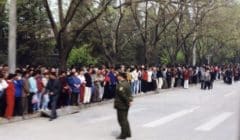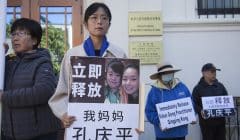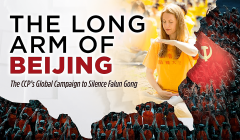Unlikely Heroes
Falun Gong practitioners around the world are waging peace against a merciless regime, one printed flier at a time.
A young software engineer arrives at Central Park in New York City. It’s cold, with a snowstorm looming.
Robert gathers a stack of fliers from his bag and stands before a row of placards about the persecution of Falun Gong in China. For the next two hours he will spend his Saturday morning handing out fliers to passers by.
On the other side of the world, Ms. Ling Chen, a woman in her mid-40s, hops on a bicycle. Carrying a bag of leaflets, she will be peddling 90 minutes to a nearby village in central China.
An accountant by trade, Ling will be spending the next four hours placing leaflets on every door in the village. After pedaling home she’ll get just a few hours of sleep before heading to work the next morning.
The two have never met, but are bound by an unspoken cause: to end the horrific persecution of Falun Gong in China.
They are part of a mounting—and global—grassroots effort, one chapter in a story of extraordinary courage and self-sacrifice.
At the heart of these efforts is a belief: awareness is a powerful deterrent to evil.
One in a million
Inside China, Ms. Ling is not an isolated case. She and others like her are not lone activists at the forefront of a movement, much less young idealists. They are mothers and daughters, students and professors, businessmen and government clerks. And they number in the millions.
Mobilized around the cause, they have formed into the largest grassroots, underground media in human history.
In tens of thousands of homes, basements, and other locales throughout China, Falun Gong practitioners make not only fliers, leaflets, and newspapers, but also banners, CDs, and DVDs.
The items are distributed throughout most every city and village across China, often under the cover of darkness.
The nighttime activity is for protection. If caught, the price for posting just one informational flier in public might be seven years in jail. And torture.
Despite appearances, these are no ordinary citizens, but heroes: they put their personal well-being on the line, using their own free time and resources to help save the lives of people they may have never met.
The power of awareness
Their goal is to get the materials they’ve produced—which unveil the persecution in China and debunk Communist Party propaganda—into the hands of as many people as possible. In a country where a repressive regime and kangaroo courts enable police and labor camp guards to torment with impunity, exposing abuses is one of the few avenues of protection that victims have.
“Awareness works,” says Levi Browde of the Falun Dafa Information Center. “When a corrupt policeman finds out that his neighbors—and his wife—know he is torturing innocent people, he thinks twice before doing it again.”
Other practitioners directly target the torturers—by calling them. An active network of people throughout China and abroad call the actual perpetrators, informing them that the world knows of their crimes and trying to convince them to stop.
The calls often begin within hours of the information having been posted online. And the responses are more encouraging than one might expect. Some perpetrators apologize. Others beg for lenience, promising to desist, if only their names could be removed from the exposés.
Sometimes the most unlikely heroes are also the most effective.
Long distance compassion
The involvement of figures like Robert in the cause, separated from the persecution by oceans, is equally remarkable.
Outside China, Falun Gong practitioners have produced television documentaries, designed internet software to counteract censorship, filed suits against key perpetrators, and even pedaled across the country.
Their motivation? It goes back to a central component of the Falun Gong practice: the concept of compassion.
“In Falun Gong, we learn to think of others first, and to develop our compassion. That means that the suffering of others is our own, and so we can’t stand by and do nothing,” says Robert.
Although Robert isn’t calling labor camps in China, he is helping to straighten them out.
“I’ll never forget the first time I met a Chinese practitioner who had been released from a labor camp after we wrote letters for him,” Robert recalls.
“He had tears in his eyes describing the moment he’d learned that so many people out there were rooting for him.”






